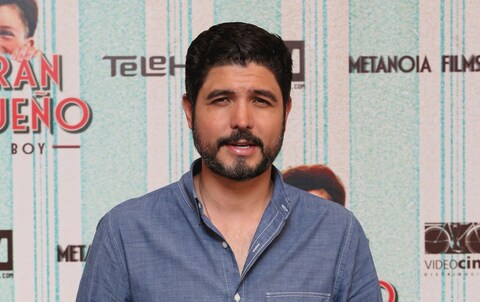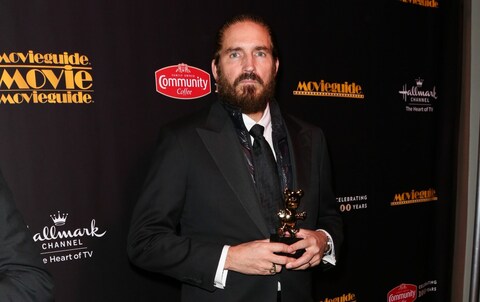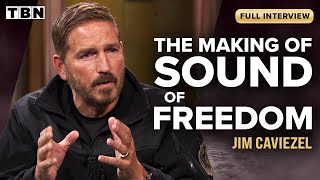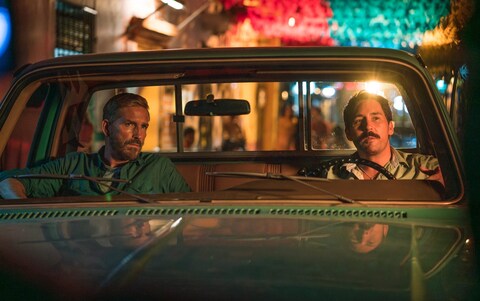‘My film made $180 million at the box office – but I’m not making a dollar’
Director Alejandro Monteverde had an unlikely reaction to the mega, unexpected success of his film, Sound of Freedom. “I just went into hiding,” he says.
The child trafficking thriller cost just $15 million and has so far made more than $180 million, at times beating Mission: Impossible and Indiana Jones at the box office. It wasn’t the success itself that sent Monteverde into hiding, but the controversy that erupted around it. Within days of its US release – on the all-important, all-American July 4th – Sound of Freedom had been weaponised for the culture war.
The film tells a (sort of) true story about anti-trafficking activist Tim Ballard and a Rambo-like mission to rescue child sex slaves. Liberal critics linked the film to the far-right QAnon conspiracy theory and have slated it as propaganda, while right wing commentators have blasted lefties for trying to supress the film’s too-hot-too-handle truths (“the usual Woke Nazis,” according to hard-right site Breitbart). Donald Trump has screened it, and Fox News dubbed it “the movie the media tried to kill”. “They’re scared,” said lead actor Jim Caviezel about the supposedly rattled mainstream press. “Quaking in their boots.”
The reaction was so intense that Monteverde retreated. “In the beginning my instinct was to hide,” says the 46-year-old filmmaker. “How do I even discuss this?”
There is a conflict, he admits: the film’s massive success vs the controversy it has created. “I’m not a big fan of controversy,” he says. “Especially on this film because it was not necessary… It started getting labelled with all kinds of crazy conspiracy theories.” Though he also admits, quite rightly, that Sound of Freedom – whether you love or hate it – has been “a phenomenon”. Distributed by the Mormon-run Angel Studios, the film has employed a “pay it forward” marketing campaign, encouraging fans to buy tickets for people who can’t afford a cinema trip.

The film is not really about the QAnon conspiracy theory, which imagines a cabal of leftist/Satanist elite paedophiles run the world and harvest the blood of children. But detractors, including The Guardian, have called the film “QAnon adjacent” for its plot about a white Christian saviour and a shady network that services wealthy American paedophiles. Not to mention the presence of Caviezel, a proponent of QAnon ideas.
Sound of Freedom has been the subject of its own conspiracy theories, which have come from both ends of the political spectrum: stories about cinemas trying to prevent people from seeing the film; and attempts to falsely inflate the audience numbers. “Both sides are feeding that,” says Monteverde.
Sound of Freedom has now arrived in British cinemas. Does Monteverde expect a similar reaction here? “I hope not,” he says.
Monteverde was inspired by a documentary about child trafficking. “This project kind of found me,” he says, and describes the film as a “calling”. It began as a straight-up fiction, but producer Eduardo Verástegui – a member of Donald Trump’s Advisory Commission on Hispanic Prosperity – suggested making it about Tim Ballard. Ballard was a Homeland Security agent for more than a decade (though this can’t be corroborated for security reasons) and the founder of the Operation Underground Railroad, an anti-trafficking organisation. OUR takes credit for saving thousands of women and children in a series of daring rescue missions. Both Ballard and the OUR have been at the centre of numerous controversies since the film was conceived – including reports of exaggerating its stories of heroism.
It was Ballard who suggested Jim Caviezel for the role of, well, Ballard. Caviezel – best known for playing Jesus in Mel Gibson’s The Passion of the Christ – is a bizarre figure who has spouted baseless QAnon drivel at conferences and claimed that he’s given his career over to Christ (JC is apparently choosing his roles).

Sound of Freedom has come under some fire for stretching the truth – playing into the supposedly embellished adventures of the OUR. In the film, Ballard heads to Colombia to save a brother and sister from sex slavery. He first sets up a fake sex hotel and then embarks on a one-man jungle mission. “With a biopic you have to take creative licence – you have to – otherwise you cannot make a movie,” says Monteverde. Angel Studios posted a blog breaking down fact and fiction.
Like the reaction, Sound of Freedom is a film of conflicting elements. It veers into made-for-TV sincerity, but has captivating moments – like a 3-star thriller version of those gotcha “paedo hunter” videos that lurk in the dark recesses of YouTube. In other places, Sound of Freedom is genuinely hard to watch. Monteverde’s mission was to make the subject palatable. “I want it to be operatic,” he says. “I don’t want it to be real.”
Talking via Zoom, Monteverde speaks with charmingly accented English. It’s the day after the Mexican premiere. “The interviews have all gone crazy,” he says. “Back-to-back since eight in the morning.” He’s unfazed by questions about the problematic furore. He knew early on that it was a troubling subject matter. “My wife would say, ‘Just don’t ruin the dinner by telling people what you’re working on – don’t be the party pooper!’” There was some nervousness about it. If the film collapsed, his career might go with it. “My calling was greater than my fear,” he says.
Monteverde was also warned off pursuing a film about child sex slavery – a tough sell at the multiplexes. “We were told so many times that this movie was hard to market,” he says. “That’s why the film was orphaned for four years… nobody believed there was an audience for it.” Sound of Freedom shot in 2018 and wrapped post-production in 2019. It was intended to be distributed by 20th Century Fox, but Fox’s merger with Disney saw the rights return to the filmmakers. It languished for four years until Angel Studios – a faith-based studio and on-demand-video service – picked it up for distribution earlier this year. “I knew it would see the light of day,” says Monteverde. “I knew it in my heart.”

Angel Studios – run by brothers, Jordan, Neal, Jeffrey and Daniel Harmon – raised the money for distribution through crowdfunding. Around 7,000 people invested varying amounts, each owning a little piece. Some investors put in as little as $10.
Between Angel Studios’ distribution and the presence of Caviezel, Sound of Freedom has been welcomed by Christian conservatives. Angel Studios has sold it as “the fight to end child trafficking”. Tim Ballard is a Mormon and the film includes some militantly holy zingers: “God’s children are not for sale.”
Monteverde’s previous films have included faith-based elements (though he doesn’t like the label). Producer Verástegui apparently told Pope Francis himself about the project (“Will you please pray for the people?” Verástegui asked His Holiness). But Monteverde insists that Sound of Freedom wasn’t made with a Christian mindset. “No, definitely not the intention,” he says. “That’s another thing that was surprising [about the controversy]. It was not made for religious people. It was made for everyone.”
The film, says Monteverde, was “labelled way too fast”. He thinks the criticism – such as being dubbed “QAnon adjacent” – was a reaction to its unexpected box office. “I think they wanted to discredit the film,” he says. “In the beginning I was very hurt by it.”
Monteverde argues that with almost $200 million in receipts, the film has surely reached beyond conservative or hard-right audiences. Indeed, a poll – as reported last month by Newsweek – found it was “surprisingly popular with Democrats”. The film currently has a Rotten Tomatoes audience score of 99 per cent.

Some success can be attributed to an effective marketing trick. While moviegoers are now conditioned to stay for a post-credits sting – usually a superhero cameo – Sound of Freedom offers up an alternative post-credits scene: Caviezel, out of character, imploring audiences to spread the word and help raise awareness. Caviezel admits that they can’t compete with the big studios’ marketing budget, so he presents a QR code and encourages audience members to buy more tickets and spread the word – the so-called “pay it forward” scheme. Was it Monteverde’s idea?
“No, definitely not my idea,” he says. “This is a forgotten film so I’m always going to be very grateful to the Harmon brothers and Angel Studios. They believed in the film and they are responsible for thinking outside the box. When they approached me and told me they were going to do that [post-credits scene], obviously I objected. But they told me to please trust them… ‘The only way this movie is going to succeed is if we create a very strong word-of-mouth and we make people participate.’ They believed in that.”
Monteverde knew the word-of-mouth was working when he received a text from a friend recommending that he should go and see a little film called Sound of Freedom. The sender had no idea that he’d actually directed it. “It was a movement, a happening,” says Monteverde. “People felt the urge to recommend this film.”
Amidst its success, Monteverde has swatted away numerous questions about QAnon – something he knew nothing about when the film began (the film was written in 2016; QAnon didn’t become widespread until 2018). Fox News has argued that it’s the left-wing media which keeps bleating about the QAnon connection, though Caviezel has invited the association, talking in QAnon-friendly terms while promoting the film and repeating some particularly bizarre ideas. Interviewed by Steve Bannon, the former strategist for President Donald Trump, Caviezel talked about adrenochrome, a chemical compound that – so the conspiracists say – is harvested from children’s blood by elite paedophiles. Caviezel told Bannon it’s an “elite drug” with “mystical qualities as far as making you look younger”.

Monteverde maintains that he knew nothing about QAnon. His reaction was, “Wow, that sounds very ridiculous.” He also laughs off a story that the film was funded by QAnon true believers. But isn’t it a problem when Caviezel spouts baseless QAnon ideas while promoting the film?
“I hired him,” says Monteverde, alluding to Caviezel’s comments. “What [actors] do personally after the movie’s finished is out of my control. I can’t control it. And I don’t want to control it because that’s the problem now in society, we want to control each other and what other people think. Yes, [Caviezel] has his own views.”
Monteverde has given it all a wide berth. “The minute I saw this got political… it’s not that I distanced myself from [Caviezel], I distanced myself from everybody.”
Mike Rothschild, a conspiracy culture expert and the author of QAnon book, The Storm is Upon Us, commented on the film. “It’s being marketed to QAnon believers, it’s being embraced by this community and its leading actor is a huge part of the QAnon community,” Rothschild told NPR. He added: “Believers are invested in the movie because they see it as a way to fight back against both the evildoers behind the supposed trafficking and the liberal machine that protects them. They don’t have any problem with both hating Hollywood and supporting it through ticket sales.”
The film has been championed, promoted, and showcased by many influential voices on the Right: Sean Hannity, Jordan Peterson, Rep. Marjorie Taylor Greene, Ben Shapiro, Mel Gibson, and – biggest of all – Donald Trump, who called it “a national sensation.” Trumps screened it at his New Jersey golf club.
But Monteverde steers clear of political endorsements – and he never attends screenings with political personalities. “For me, politics divides,” he says. “Unfortunately, any endorsement politically is always going to hurt [a film].” He adds: “I like to make art that creates conversations. I like to make art and films that propose a question. I don’t have the answers. I’m actually looking for the answers.”
He removed himself from social media several years ago. He’s not exposed to the most toxic discourse around his film and hasn’t interacted with any truther fans. A cursory glance on Twitter reveals just how deranged and scary it gets. Twitter right winger Matt Wallace warned his 1.2 million followers that Netflix and Amazon (both of which passed on the film) “do not want the truth about pedowood to come out”. There are reports of the film’s fans harassing real trafficking victims.
Now the film is subject to various conspiracy theories. Some cinemagoers have claimed that screens are almost sold out, but then the seats are empty – suggesting that pay it forward tickets are being bought for non-existent viewers. Other social media users have reported that AMC cinemas were trying to drive viewers away by turning off the air conditioning or turning down the volume – to stop people seeing his film (the AMC CEO chimed in to deny these claims). Another widely shared story says that Amazon and Netflix have “banned” the film. Which they haven’t – they just passed on it. Monteverde laughs off the myths that have spawned from the film.
“Once you build a narrative based on conspiracy, you create a language that is conspiratorial,” says Monteverde. “Then you respond with conspiracy theory. Really, you think a theatre is going to boycott a movie?”
In the years since the film was made, Tim Ballard and the OUR have faced controversy. In 2021, an investigation by Vice found that OUR had exaggerated its efforts, employed amateurish methods, and may have even created more demand for sex trafficking by going undercover and offering money for underage victims. The organisation was also investigated by federal agencies about whether it had misled donors and whether OUR operatives had engaged in sexual acts with trafficking victims. The investigation was dropped. Questions have also been asked about the network of Ballard-connected organisations surrounding OUR, and whether Ballard had monetised his non-profit rescue operation. In 2020, Donald Trump appointed Ballard as co-chair of his Public-Private Partnership Advisory Council to End Human Trafficking. Vice reported in July – shortly after Sound of Freedom hit cinemas – that Ballard had quietly departed Operation Underground Railroad.
“All of that came out way after I shot the film,” says Monteverde. “All of that was way out of my control.”

Still, anti-trafficking experts and groups have criticised Sound of Freedom for its inaccurate depiction of human trafficking. Suamhirs Piraino-Guzman, from the United Nations’ fund for victims of human trafficking and modern slavery, said the movie is “full of assumptions and a dangerous portrayal of what trafficking is”.
“I say, I’m not an expert on human trafficking, I’m a filmmaker,” says Monteverde at one point in our conversation. He also says: “For me this movie was not about the facts. It was always about proposing a theme. Let’s talk about this. Let’s create a social conversation about child abuse.”
The furore around Sound of Freedom is almost deafening. Does Monteverde regret the kind of success it’s had? Has controversy overshadowed the message? “It overshadows before you watch the movie – 100 per cent,” he says. “It taints it.” But he’s confident that once you see the film, you’ll understand it.
Monteverde has missed out on the success in one way. “I’m not making a dollar,” he says. Even with a haul of $180 million. When the film was shelved, he sold his points for necessary funds. “I sold my points for nothing – very, very little,” he says. “I’m hoping one day I’ll get a bonus.”
Sound of Freedom is in cinemas now
This article has been archived for your research. The original version from The Telegraph can be found here.


